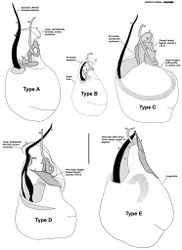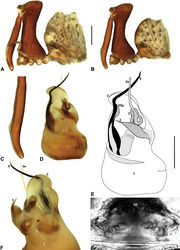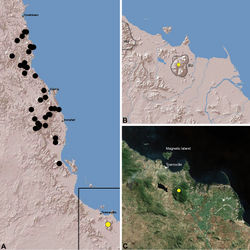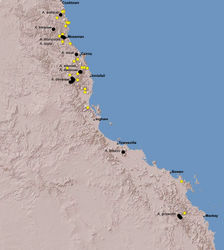Austrarchaea hoskini
| Notice: | This page is derived from the original publication listed below, whose author(s) should always be credited. Further contributors may edit and improve the content of this page and, consequently, need to be credited as well (see page history). Any assessment of factual correctness requires a careful review of the original article as well as of subsequent contributions.
If you are uncertain whether your planned contribution is correct or not, we suggest that you use the associated discussion page instead of editing the page directly. This page should be cited as follows (rationale):
Citation formats to copy and paste
BibTeX: @article{Rix2012ZooKeys218, RIS/ Endnote: TY - JOUR Wikipedia/ Citizendium: <ref name="Rix2012ZooKeys218">{{Citation See also the citation download page at the journal. |
Ordo: Araneae
Familia: Archaeidae
Genus: Austrarchaea
Name
Austrarchaea hoskini Rix & Harvey sp. n. – Wikispecies link – ZooBank link – Pensoft Profile
- Austrarchaea sp. n. Rix and Harvey 2012b[1]: 376, fig. 1G.
Vernacular name
Mount Elliot Assassin Spider
Type material
Holotype male: Mount Elliot, [Bowling Green Bay National Park], Upper North Creek, Queensland, Australia, [19°29'S, 146°57'E], rainforest, 1000 m, 2–5.XII.1986, G. Monteith, G. Thompson, S. Hamlet (QMB S30811).
Paratypes
Allotype female, Mount Elliot, [Bowling Green Bay National Park], North Creek, Queensland, Australia, 19°29'S, 146°57'E, 1000 m, 25–27.III.1991, G. Monteith, D. Cook (QMB S17937); 1 male, 1 female, same data (QMB S23045).
Other material examined
AUSTRALIA: Queensland: Bowling Green Bay National Park: same data as holotype, 1 juvenile (QMB S30811); same data as holotype except pitfall trap, 3–5.XII.1986, 1 juvenile (QMB S30839).
Etymology
The specific epithet is a patronym in honour of Dr Conrad Hoskin, for his contributions to our understanding of Wet Tropics biogeography, and for his efforts in documenting the remarkable endemic biota of Mount Elliot.
Diagnosis
Austrarchaea hoskini can be distinguished from all other Archaeidae from north-eastern Queensland by the presence of a unique Type D pedipalp (Fig. 6), with a prolaterally directed conductor (Figs 6, 14E), very large, dagger-shaped tegular sclerite 3 (TS 3) (Figs 6, 14E–F), and prominent, rounded, fin-shaped embolic spur (Fig. 14E).
Description
Holotype male: Total length 3.44; leg I femur 3.59; F1/CL ratio 2.86. Cephalothorax dark reddish-brown; legs tan-brown with darker annulations; abdomen mottled grey-brown and beige, with darker brown dorsal scute and sclerites (Fig. 14B). Carapace very tall (CH/CL ratio 2.29); 1.26 long, 2.87 high, 1.21 wide, ‘neck’ 0.59 wide; bearing two pairs of rudimentary horns; highest point of pars cephalica (HPC) near posterior third of ‘head’ (ratio of HPC to post-ocular length 0.63), carapace almost horizontal posterior to HPC; ‘head’ not strongly elevated dorsally (post-ocular ratio 0.28). Chelicerae with short brush of accessory setae on anterior face of paturon (Fig. 14C). Abdomen 2.00 long, 1.54 wide; with two pairs of dorsal hump-like tubercles (HT 1-4); dorsal scute fused anteriorly to epigastric sclerites, extending posteriorly to first pair of hump-like tubercles; HT 3-4 each covered by separate dorsal sclerites. Unexpanded pedipalp (Figs 14D–F) of Type D morphology (Fig. 6), with large, prolaterally directed, arched conductor; embolus distally directed, sinuous, with prominent, rounded, fin-shaped spur proximal to distal kink in embolus, embolus projecting beyond distal rim of conductor by ~1/3 length of exposed embolic portion; tegular sclerite 3 (TS 3) very large, dagger-like, directed pro-ventrally across bulb; TS 2-2a forming looped, figure-of-eight-shaped structure in ventral view, TS 2 rounded distally, TS 2a projecting beyond distal rim of conductor to near tip of embolus; TS 1 very small, indistinct, probably embedded within haematodochal membranes.
Allotype female: Total length 3.79; leg I femur 3.44; F1/CL ratio 2.44. Cephalothorax dark reddish-brown; legs tan-brown with darker annulations; abdomen mottled grey-brown and beige (Fig. 14A). Carapace tall (CH/CL ratio 2.10); 1.41 long, 2.96 high, 1.31 wide; ‘neck’ 0.72 wide; bearing two pairs of rudimentary horns; highest point of pars cephalica (HPC) approaching posterior quarter of ‘head’ (ratio of HPC to post-ocular length 0.71), carapace almost horizontal anterior and slightly posterior to HPC; ‘head’ not strongly elevated dorsally (post-ocular ratio 0.29). Chelicerae without accessory setae on anterior face of paturon. Abdomen 2.31 long, 1.87 wide; with four pairs of dorsal hump-like tubercles (HT 1-4). Internal genitalia (Fig. 14G) with cluster of ~6 variably-shaped spermathecae on either side of gonopore, clusters widely separated along midline of genital plate; innermost (anterior) spermathecae longest, sausage-shaped, bent laterally; other spermathecae variably sausage-shaped or pyriform.
Variation: Males (n = 2): total length 3.38–3.44; carapace length 1.22–1.26; carapace height 2.78–2.87; CH/CL ratio 2.28–2.29. Females (n = 2): total length 3.59–3.79; carapace length 1.41 (invariable); carapace height 2.96–3.12; CH/CL ratio 2.10–2.21.
Distribution and habitat
Austrarchaea hoskini is known only from Mount Elliot, 30 km south-east of Townsville (Figs 23, 25). The few known specimens were collected in high altitude rainforest along North Creek.
Conservation status
Unknown (data deficient).
Original Description
- Rix, M; Harvey, M; 2012: Australian Assassins, Part III: A review of the Assassin Spiders (Araneae, Archaeidae) of tropical north-eastern Queensland ZooKeys, 218: 1-50. doi
Other References
- ↑ Rix M, Harvey M (2012b) Phylogeny and historical biogeography of ancient assassin spiders (Araneae: Archaeidae) in the Australian mesic zone: evidence for Miocene speciation within Tertiary refugia. Molecular Phylogenetics and Evolution 62: 375-396. doi: 10.1016/j.ympev.2011.10.009
Images
|



